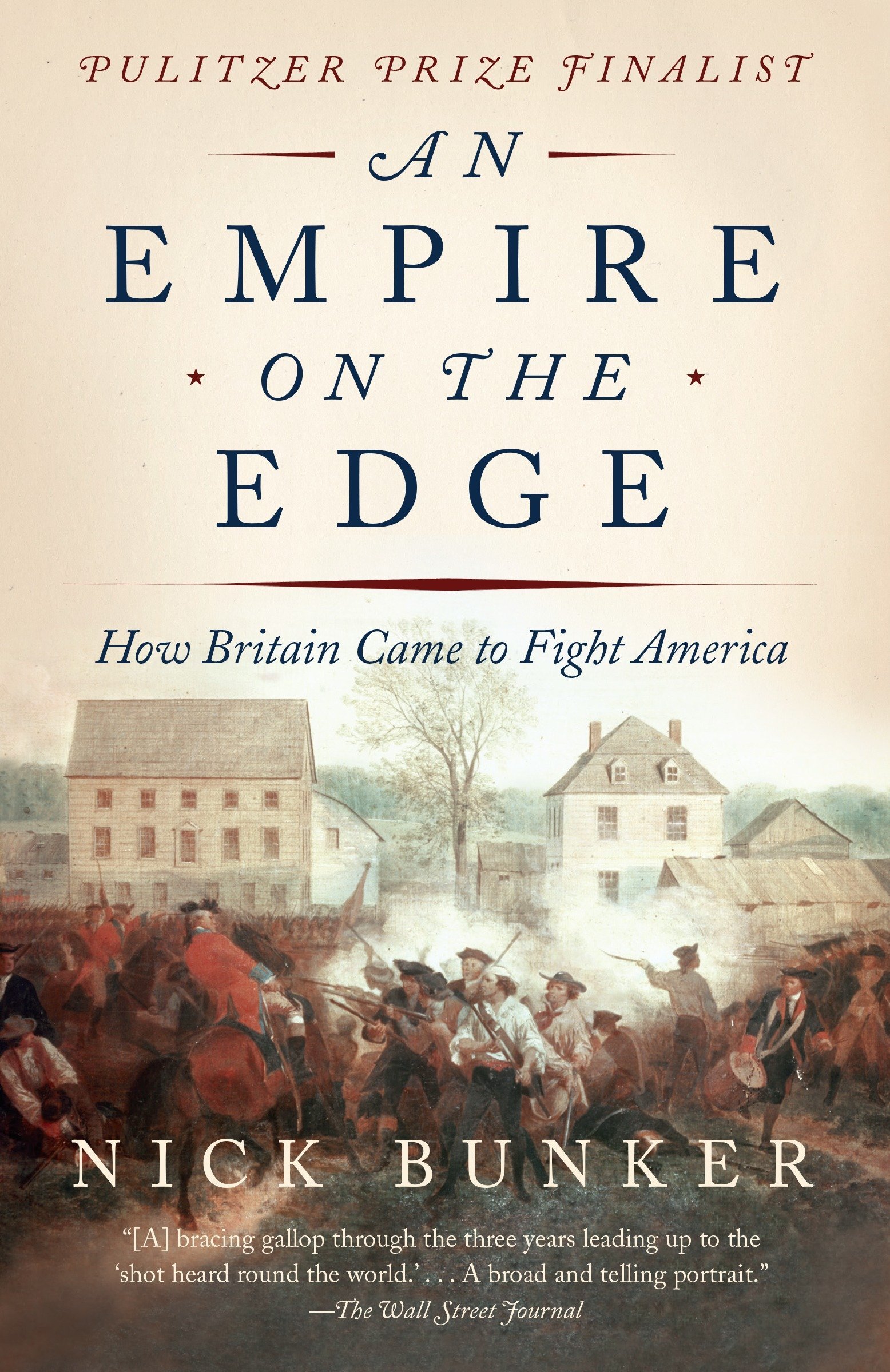An Empire on the Edge
by Nick Bunker — 2015 George Washington Prize Winner!

An Empire on the Edge: How Britain Came to Fight America
By Nick Bunker
488 pp., Vintage
$12.00
Written from a strikingly fresh perspective, author Nick Bunker brings us a new account of the Boston Tea Party and the origins of the American Revolution. The narrative shows how a lethal blend of politics, personalities, and economics led to a war that few people welcomed but no one could prevent.
In this powerful, fair-minded work, British author Nick Bunker tells the story of the last three years of mutual embitterment that preceded the outbreak of the American War of Independence in 1775.
“It was a tragedy of errors, in which both sides shared responsibility for a conflict that cost the lives of at least 20,000 British and a still larger number of Americans,” explains Nick Bunker, winner of the 2015 George Washington Prize. “It teaches us how the British and the colonists failed to see how swiftly they were drifting toward violence until the process had gone beyond the point of no return.”
At the heart of the book lies the Boston Tea Party, an event that arose from fundamental flaws in the way the British managed their affairs.
“By the early 1770s, Great Britain had become a nation addicted to financial speculation, led by a political elite beset by internal rivalry and increasingly baffled by a changing world,” Bunker writes. “When the East India Company came close to collapse, it patched together a rescue plan whose disastrous side effect was the destruction of the tea.
“With lawyers in London calling the Tea Party treason, and with hawks in Parliament crying out for revenge, the British opted for punitive reprisals without foreseeing the resistance they would arouse. For their part, Americans underestimated Britain’s determination not to give way. By the late summer of 1774, when the rebels in New England began to arm themselves, the descent into war had become irreversible.”
Drawing on careful study of primary sources from Britain and the United States, Bunker’s “An Empire on the Edge” sheds new light on the Tea Party’s origins and on the roles of such familiar characters as Benjamin Franklin, John Hancock, and Thomas Hutchinson.
The book shows how Great Britain’s prime minister, Lord North, found himself driven down the road to bloodshed. At his side was Lord Dartmouth, the colonial secretary, an evangelical Christian renowned for his benevolence. In a story filled with painful ironies, perhaps the saddest was this: that Dartmouth, a man who loved peace, had to write the dispatch that sent the British army out to fight.
Congratulations to Nick Bunker, winner of the 2015 George Washington Prize.
Be sure to check out the books that were also up for the 2015 prize.
- “The Royalist Revolution,” by Eric Nelson
- “When the United States Spoke French,” by François Furstenberg
- “A Tale of Two Plantations,” by Richard Dunn
 Four questions for Pulitzer Prize Finalist Nick Bunker — winner of the George Washington Prize — regarding his book, “An Empire on the Edge” (Alfred A. Knopf, September 2014)
Four questions for Pulitzer Prize Finalist Nick Bunker — winner of the George Washington Prize — regarding his book, “An Empire on the Edge” (Alfred A. Knopf, September 2014)
Grateful American™ Foundation: Nick, what inspired you to write this book?
Nick Bunker: In 2009, when I began my research, I intended to write a very tightly focused narrative account of the Boston Tea Party, with the story told for the first time from a British perspective. Back in the 1960s the American scholar Benjamin Woods Labaree produced a superb analytical account of the Tea Party, but I felt that he’d neglected the human side of the affair, which I wished to emphasize. As my project unfolded, however, I soon realized that I would have to make the scope of the book far wider, to encompass the whole of the chain of events that led to bloodshed at Lexington and Concord in April 1775. There was a revolutionary explosion, and it came about from a chemical reaction of all kinds of unstable elements. On the British side, we find ignorance, prejudice, bad economics, and misplaced priorities. In America, there were too many people too inclined to believe the very worst about King George III and his politicians.
Grateful American™ Foundation: What are the three big lessons you hope readers will take away from “An Empire on the Edge”?
Nick Bunker: If I were a professor teaching a strategy course for senior officers in the military, or if I were a professor of political science, I would give my students a case study on the American Revolution. The question would be: If you had been Lord North — the British prime minister — how would you have tried to prevent Americans from seceding from the British Empire? Soon enough, the students would see that the British made three crucial mistakes. First, they failed to keep their ears to the ground and listen with an open mind to their aggrieved colonial subjects, preferring to take their information about America from biased accounts given by royal officials such as Thomas Hutchinson, the governor of Massachusetts.
Second, the British never made adequate contingency plans to cover the possibility of an armed insurgency in New England, even though such an event could have been predicted.
And third — and this applies to the colonists as well — there was a tendency to make moral and political decisions based on narrow-minded ideology.
Grateful American™ Foundation: When was the moment in your childhood or later life when you developed a passion for American history? And what do you think can be done to inspire more kids to get excited about learning about the past?
Nick Bunker: I can tell you the moment very precisely. It was 7 a.m. on November 23rd, 1963. It was a cold but sunny day in England, with a bright blue sky. It was two days away from my 5th birthday, and my mother came into my bedroom and — almost in tears — told me that the day before, President Kennedy had been assassinated in Dallas. In the years that followed, night after night our television screens were filled with images from the USA, or from Vietnam: the Tet offensive in 1968, the assassinations of Dr King and Robert Kennedy, and then the Apollo moonshots, for which we would stay up all night. Watergate came next! The United States of America always seemed to be a larger-than-life place, where everything happened in Technicolor and 3-D. What was more, America seemed to be the nation where life was most vivid, most intense, and where human beings were most deeply committed to ideals, wherever those ideals might lead them. America was also a very complicated terrain, impossible to comprehend entirely but endlessly fascinating nonetheless! And that’s what I’d say to encourage young people in America to learn about their history.
Grateful American™ Foundation: What will you do with the prize money — and what will be your goal to accomplish during your year of being the reigning Prize winner?
Nick Bunker: My wife, Sue, and I enjoy the great privilege of inhabiting a wonderful medieval house in Lincoln, England, built in the 12th century, within a few hundred yards of a great cathedral from the same era. Since we are determined to preserve our house for future generations, we have to spend money to maintain it, and that’s where much of the award will be allocated. I hope to give as much time as I can to visits to the USA, encouraging young Americans to remember their British antecedents. I also have to research my next book, which has to do with the young Benjamin Franklin.
- “The Royalist Revolution,” by Eric Nelson
- “When the United States Spoke French,” by Francois Furstenberg
- “A Tale of Two Plantations,” by Richard Dunn



